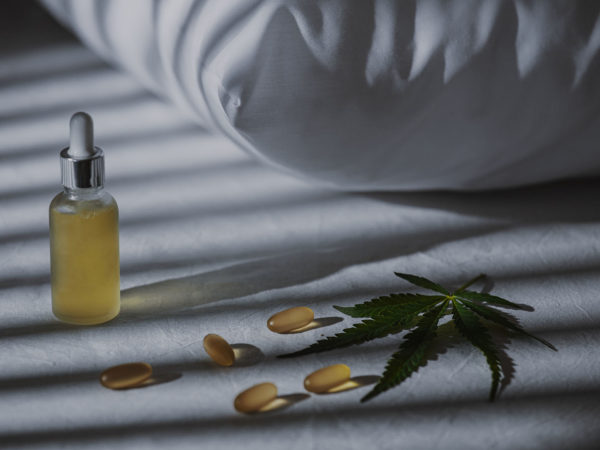Cannabis For Better Sleep?
Is it true that cannabis can help relieve insomnia, or improve the quality of sleep?
Andrew Weil, M.D. | September 30, 2022

Sleep disorders are a widespread problem – the Centers for Disease Control and Prevention (CDC) estimates that 70 million Americans suffer from a chronic sleep issue. Insomnia, meaning difficulty falling asleep or staying asleep, is the most common sleep concern, followed by sleep apnea, in which someone stops breathing for 10 seconds or more while sleeping. Many people experience sleep disruptions as a result of chronic pain or other disorders, including Parkinson’s disease, multiple sclerosis, depression, or post-traumatic stress disorder (PTSD). Understanding the cause of a sleep issue helps identify promising solutions, including cannabis — which is potentially more effective for some sleep issues than others.
A healthy night’s sleep is a complex process. We cycle through different stages (from awake through rapid eye movement, or REM, sleep, repeated about five times a night), with corresponding changes in brain waves as we slip into deepening levels of sleep. Research into how cannabis affects those cycles has been hampered in the United States due to the patchwork of federal and state regulations, but there have been some studies performed and published.
The two best-known cannabinoid compounds in cannabis – THC and CBD – have activity in many of the structures in the brain that are involved in sleep. A small number of studies have looked at the effects of THC and CBD on sleep, but the results are not compellingly positive (in fact, some show negative effects.)
A research review published in 2020 by neurologists at the Johns Hopkins University School of Medicine found that studies within the general population didn’t show a uniformly beneficial effect on sleep in those who used cannabis. In populations whose sleep disruptions were caused by pain, however, cannabis had more positive results — better pain control led to fewer sleep interruptions. That review also found cannabis use had beneficial effects on those with PTSD, multiple sclerosis and sleep apnea (although it was less effective than positive airway pressure, or PAP, devices).
Other recent studies considered the expectations of those who used cannabis on its perceived effectiveness. Those who expected it to help relieve symptoms of sleep disorders were more likely to report positive outcomes, regardless of the actual effects on sleep. (The same held true for alcohol and over-the-counter sleep aids.) The effect of mind-set is powerful.
I’m a big proponent of improving sleep hygiene with changes of daily habits – see my guide to better sleep for more information about how to improve your sleep naturally. For those who need extra help getting a good night’s sleep, I recommend considering valerian and melatonin. (See this article about other natural approaches to insomnia.)
Andrew Weil, M.D.
Sources
Choi S, Huang BC, Gamaldo CE. Therapeutic Uses of Cannabis on Sleep Disorders and Related Conditions. J Clin Neurophysiol. 2020 Jan;37(1):39-49. doi: 10.1097/WNP.0000000000000617. Erratum in: J Clin Neurophysiol. 2020 Sep;37(5):466-467. PMID: 31895189. https://pubmed.ncbi.nlm.nih.gov/31895189/
Winiger EA, Hitchcock LN, Bryan AD, Cinnamon Bidwell L. Cannabis use and sleep: Expectations, outcomes, and the role of age. Addict Behav. 2021 Jan;112:106642. doi: 10.1016/j.addbeh.2020.106642. Epub 2020 Sep 6. PMID: 32949837; PMCID: PMC7572650. https://pubmed.ncbi.nlm.nih.gov/32949837/
Altman BR, Mian MN, Slavin M, Earleywine M. Cannabis Expectancies for Sleep. J Psychoactive Drugs. 2019 Nov-Dec;51(5):405-412. doi: 10.1080/02791072.2019.1643053. Epub 2019 Jul 18. PMID: 31319769. https://pubmed.ncbi.nlm.nih.gov/31319769/










